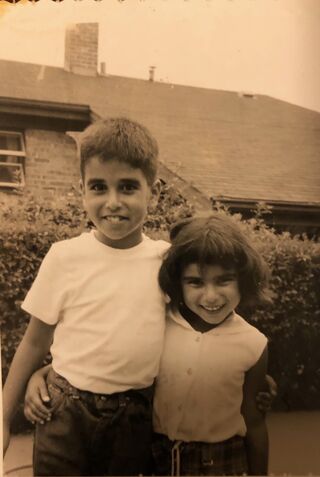Family Dynamics
Mark National Siblings Day by Making Peace With Estrangement
The estranged may feel heartbroken on National Siblings Day. Here's how to cope.
Posted April 5, 2022 Reviewed by Ekua Hagan
Key points
- For the estranged, National Siblings Day is no cause for celebration, but rather a painful reminder of the void in their lives.
- To cope with estrangement on National Siblings Day, identify, anticipate, and avoid painful triggers—especially images on social media.
- The opposite of estrangement is not necessarily reconciliation; it is peace.

National Siblings Day is April 10—just around the corner. For sisters and brothers who enjoy good relationships, it’s a welcome cue to appreciate those loving bonds. But for the estranged, National Sibling Day is no cause for celebration.
Quite the contrary: The dreaded day is a painful reminder of the void in their lives. The hurt is worsened by the annual social-media flood of happy childhood photographs, along with loving tributes to brothers and sisters. Indeed, many who don’t live in the U.S. are relieved that their country doesn’t observe a sibling holiday.
Painful triggers
Birthdays, holidays, traditional family events, even Mother’s Day: All can upset an estranged sibling’s equilibrium. When I was estranged from my only brother, I wrestled with the same old questions every July, as his birthday approached: How is he doing? Is he celebrating? Should I send him a card, an email, a text?
To protect yourself and find peace in estrangement, it’s important to:
- Identify painful triggers, anticipate, or avoid them wherever possible.
- Put away photos or memorabilia that create distress.
- Block contact on social media and avoid scrolling, especially on National Siblings Day.
- Try to curb rumination about your grief and losses.
- Be realistic about the relationship. Accept what it is, rather than fantasizing about what you wish you had.
One member of an estranged siblings’ Facebook page realized she was being triggered by members’ comments. To protect herself, she simply left the group. In her final message, she wrote that when she read others’ painful posts, she absorbed their pain—so much that it took a mental toll. She felt she had to quit the group because, to cultivate her own happiness, she no longer wished to try to understand the complexities of sibling estrangement.
Creating a family of choice
Cultivating close, healthy relationships with people outside the family helps create a sense of belonging. “Voluntary kin can serve as excellent sources of support and fulfill the roles we associate with family,” says Dr. Kristina Scharp, an assistant professor and director of the Family Communication and Relationships Lab at University of Washington. “Many people have a difficult time separating the idea of family from biology and law. Yet there is nothing inherent about biology or the law that guarantees a happy or satisfying sibling relationship.”
Many who participated in my survey for my book, Brothers, Sisters, Strangers, reported opening their hearts to surrogates or voluntary kin:
"I’m starting to realize that most of the 'sister' relationships that I crave can be met through loving, healthy friendships."
"I’ve got a family made up of friends and coworkers. I had to create a whole new family. I’m hurt, but I’m enjoying life, as lonely as it is."
"'Family' means little to me. What matters is how I’m loved by the people who choose to be in my life."
As the poet Maya Angelou put it: “Family isn’t always blood. It’s the people in your life who want you in theirs. The ones who accept you for who you are. The ones who would do anything to see you smile, and who love you no matter what.”
Understandably, it may be easier to maintain a relationship with voluntary kin than with an actual sibling. First, friends aren’t part of the original family’s history and dysfunction; they don’t know and thus can’t weaponize hot‐button issues. Second, all siblings must differentiate themselves from brothers or sisters while sustaining some connection. To accomplish this goal, siblings typically distance themselves from one another in young adulthood, reuniting when boundaries are well-established. This process isn’t necessary with voluntary kin.
Finding meaning in the sibling estrangement experience
Reaching peace with estrangement may involve creating new rituals or making some gesture to acknowledge the loss, even casting it in a more positive light. Those who cope best find meaning in the estrangement experience itself. Service to others suffering similar losses helps heal any trauma. Estranged siblings might participate in campaigns for awareness or support groups, reducing feelings of isolation and gaining insights from other members.
When an estranged sibling lets go of an irreparable relationship with a sister or brother, he or she often experiences posttraumatic growth— positive change that arises from facing down adversity. This growth occurs as the estranged sibling develops a stronger sense of self, feels increased compassion for others, and acquires an improved appreciation for life.
The opposite of estrangement is not reconciliation, explains author Laura Davis, whose seven best-selling books include I Thought We’d Never Speak Again. Rather, the opposite of estrangement is peace. “Even a failed reconciliation can open a new door,” she writes, "bringing deeper self-knowledge, unexpected opportunities, new chances to love, and ultimately a sense of peace."
References
Davis, Laura, (2003) I Thought We'd Never Speak Again: The Road from Estrangement to Reconciliation, William Morrow Paperbacks.




